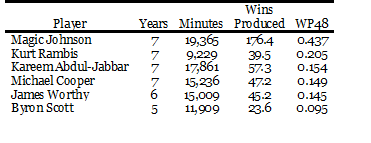Kevin Love is frustrated. Not only is he playing for a team that is being outscored by more than 17 points per game (the worst mark in the NBA), he also finds himself sitting on Minnesota's bench for about 21 minutes per game.
Love is now in his third season. In his first two seasons the Timberwolves were also quite bad, winning only 39 games. Of these wins, 21 can be traced to the production of Love (click here for the basics of the Wins Produced calculation). Despite this production, though, Love has never averaged more than 29 minutes per game.
This season, Love is on pace to produce nearly 10 wins. His teammates, though, are obviously not helping. And how much Love can help is being limited by Kurt Rambis, the head coach that keeps sending Love to the bench.
The question of why Rambis won't give Love more minutes is puzzling most NBA observers. As Chris Broussard of ESPN.com observes:
"...many executives and scouts throughout the NBA are stunned by Love's lack of playing time. "You have to be on crystal meth not to give Love more minutes on that team,'' one scout told me. "It makes no sense.''
Perhaps we can make sense of this decision if we focus on something that happened about 30 years ago. In1981 the LA Lakers signed Kurt Rambis - a power forward who had only played professionally in Greece - to a free agent contract. Rambis went on to start 43 games in his first season with the Lakers, a team that took the title in 1982. Rambis went on to play six more seasons with the Lakers, winning three more rings as the primary starting power forward for the Showtime Lakers.
Although Rambis saw quite a bit of team success, NBA fans might not suspect that Rambis was very important to this team. Player evaluation in the NBA tends to be driven by scoring. And Rambis was never a scorer with the Showtime Lakers. Across seven seasons he only averaged 5.3 points per game.
When we look beyond scoring in the box score, though, we see that Rambis actually did quite a bit for the Lakers. From 1981-82 to 1987-88, the following six players were the only Lakers to play at least five seasons and see at least 5,000 minutes on the court. These six Lakers also combined to produce 389 wins, or 93% of the team's regular season wins across these seven seasons.

Obviously thy key player on these Lakers was Magic Johnson. The average player posts a WP48 [Wins Produced per 48 minutes] of 0.100. As one can see, Magic posted a mark that was four times higher than this average. And this production translated into 25.2 wins per season.
Although Magic was... okay, magical; he was hardly the only productive Laker. Kareem Abdul-Jabbar, Michael Cooper, and James Worthy were also above average performers (and Byron Scott was just a shade below average). Each of these players, though, did not offer as much as Rambis on a per-minute basis. Rambis, though, did not play nearly as many minutes as the other key Showtime performers.
To understand why Rambis spent so much time on the bench, we need to understand what determines how many minutes a player sees on the court. Studies of player evaluation in the NBA (a list that includes examinations of free agent salaries, where a player is selected in the NBA draft, and the coaches voting for the All-Rookie team) all indicate that scoring totals are the factor that dominates player evaluation in the NBA. Shooting efficiency, rebounds, and turnovers -factors that primarily dictate outcomes in the NBA - are less important and/or found to be completely insignificant.
When we turn to the determinants of minutes per game we see a similar story. After personal fouls (which obviously limit minutes per game), minutes are primarily determined by a player's scoring per-minute. And since Rambis didn't score much, Rambis didn't get to play as much as the other key players on the Showtime Lakers.
Rambis, though, was a very productive non-scorer. And when we look at Kevin Love, we see a somewhat similar story. Love does take many more shots than Rambis. But Love's low level of shooting efficiency means that few people are going to confuse Love with some of the game's most productive scorers. Despite this inability to be an outstanding scorer, Love still produces wins because he is an amazing rebounder. Yes, much like his head coach - who also was a very good rebounder - Love can produce wins without being a prolific scorer.
Of course, Love can't grab rebounds on the bench. But Rambis apparently doesn't think enough of Love's production to make sure he stays in the game. And I suspect that this is because Rambis probably doesn't believe he was an important player for the Showtime Lakers.
So maybe Love needs to sit Rambis down and have a talk with his head coach. If Love can convince Rambis that "Superman" (yes, that is what they used to call Rambis) was really a productive player, Rambis will see that Love is also a very productive player. And then maybe Love - like many other productive stars - will finally get some love from his head coach (and then writers can't stop playing around with Love's last name).
One last note... Andres Alvarez offers a website that presents the current Wins Produced numbers for each player in the NBA. These numbers indicate that just giving minutes to Love won't solve the problems in Minnesota. This team really needs a few more productive NBA players. So even if Love spends more time on the court, both he and Rambis are going to find themselves frequently on the wrong side of the scoreboard.
